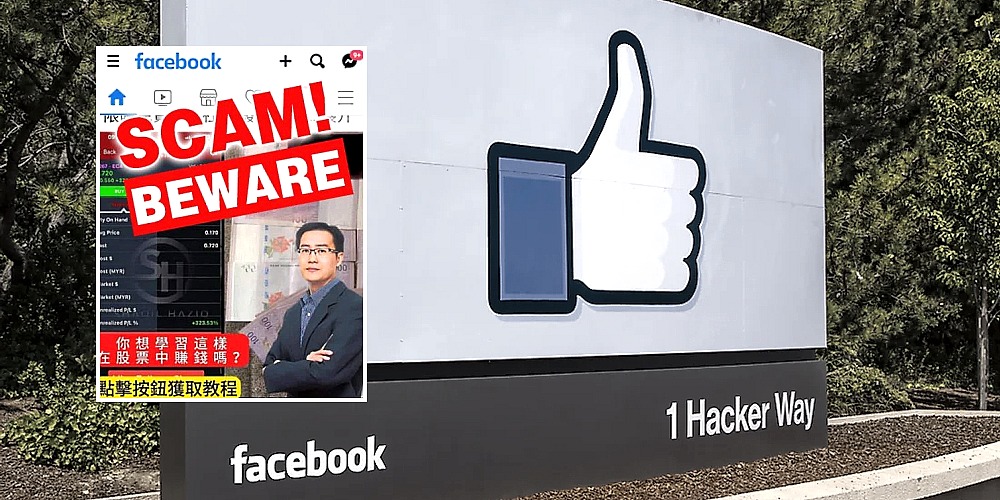Let’s get this very clear: while we owe Failbook tremendously for making a forum of free speech available to us, it is detestable that its boss, having himself made a massive fortune from it, has allowed the platform to be abused by scammers to take advantage of poor helpless users.
For so many years, we have been receiving a continuous stream of short messages on a daily basis, inquiring about the authenticity of ads, promotions and events posted on Facebook aka Failbook.
The scammers are very busy, apparently. So are we!
Even my profile picture has been targeted and abused by a scam syndicate to entice the uninitiated into some form of dubious online investment.
These scammers do have a good sense of humor, I have to agree, and I have slowly given up reporting them, mainly because the social media platform’s parent company Meta is not known for taking serious actions in response to scam reports.
So when I saw that Meta’s CEO Mark Zuckerberg posted a picture of his family of five, with the faces of his two daughters covered with smileys, my fury only grew stronger.
Many will have the same question whether users like us should just have the faces on our pictures masked likewise? But Meta did not respond to media question why the CEO had done this, or should I just assume that Zuckerberg treated them as transparent?!
As a matter of fact, we do not at all need an answer from him personally, as anyone with the slightest sense could tell that he was protecting his children.
Well, to protect their privacy (either their own or their company’s), they have been extremely cautious. For instance, Zuckerberg posted in 2016 a picture that even the dumbest could tell was a happy photo promoting his company’s Instagram platform. But the sharp-eyed could instantly point out the taped camera lens of the desktop computer; even the mic was sealed. No chance for eavesdropping competitors and hackers!
Many Failbook users might not be aware that sharing their children’s photos on social media easily exposes them to all kinds of abuses and exploitation.
Zuckerberg has made huge bucks to be in the world’s ultra rich club, thanks largely to his facial recognition technology. Ironically, this guy would never let his own children’s faces be exposed in public. For your information, his wife Priscilla Chan is a pediatrician by training.
Zuckerberg has not even offered a word of advice to his 2.9 billion users that they, too, should be as careful as him, as doing so will disrupt Failbook’s algorithmic processes, and is the last thing on the mind of a CEO who goes after every cent of business.
Calling him a profit-minded businessman might be harsh on him, but he is most definitely not as dumb as to do something that will undercut the profitability of his business.
To be fair, he is just a normal human being who values his family’s privacy and safety. As for users of his social media platform, they are nothing better than instruments that will facilitate his continued wealth creation, data collection and his money-spinning algorithm machine.
As for users whose life savings have been wrung dry by scam syndicates through his Failbook and other platforms, they have no one to turn to, except blaming themselves for so easily falling into the traps set up by the scammers, and having their money transferred to the wrong accounts at the click of a mouse out of sheer greed or curiosity.
The millions of scam victims around the world are not the responsibility of a man who cares so much for his own family, and redeeming the lost souls has never been written in Meta’s corporate mission statement.

Anyway, due to the ease of setting up new accounts and relative freedom of expression, no one actually cares how real an advertisement claim is. FB is not the most powerful social media site on this planet without a reason!
As its user base is now approaching the three billion mark — far more than the population of any single country in this world — Failbook’s clout has outgrown the erstwhile mailman next door to a super convenient and high-octane social media giant, a monster ready to upend the existing world order!
Starting from the Arab Spring of late 2010 to the “Occupy Wall Street” and Cairo Tahrir Square Revolution the following year, and the 2014 Hrushevskoho Street riots in Kyiv, the world has witnessed the meteoric rise of the power of social media, in particular FB.
To put things into perspective, Failbook’s global user base had only crossed the 600 million threshold back in the last quarter of 2010.
Such civilian movements that were quickly quelled were the talks of the town back then. Unfortunately, after the passion died down, no sustainable new political order has been born. Terror outfit the likes of ISIS were once ravaging much of the Middle East, but social media platforms had no obligation whatsoever to fix the chaotic aftermath.
Politics is one thing, and the greed to sap ad revenue out of conventional media was another. In view of the threatened survival of the media industry, some countries have decided to take actions.
In 2021, Australia took the lead in enacting a law to make Failbook and Google pay for the news content they use. The Aussie “achievement” has apparently inspired other countries to follow suit.
From toppling sitting regimes to wrestling with Western governments for supremacy, we have seen that even Canadian prime minister Justin Trudeau has openly accused that his country’s news supply is maliciously disrupted by Google and Failbook. Now you see how dreadful the powers of these tech giants are!
Sure enough the FB business has not been a smooth-sailing venture all the while. The EU General Data Protection Regulation that went into effect in May 2018 is making life tougher for Meta et al.
In May this year, EU fined Meta a record €1.2 billion (approximately RM6.1 billion) for inappropriately transferring data collected from some 255 million users to the United States.
As Failbook has grown into a colossal monster richer than many smaller states, it has the guts to disparage and challenge any sovereign country it pleases. And because of that, it shows no mercy for humble beings hoodwinked by scam syndicates.
Under such circumstances, countries in which Failbook is allowed to operate, including Malaysia, should no longer oblige themselves to the protection of commercial freedom for fear foreign investors will back off, thus allowing their own citizens to continue to come under the exploitation of Failbook and the colluding scammers.
Almost all of Failbook’s revenue has derived from online advertisement sale. No one knows exactly how many of these advertisements have been placed by scam syndicates, and Failbook is not so dumb as to spill the beans.
The thing is, scam ads are omnipresent on Failbook. Any misstep could cost a person dearly, yet we see so many all around us who will so readily be tempted by malicious ads. Anyway, the government has the obligation to protect these people and hunt down the criminals.
Now that Meta and its family-loving CEO pretend to remain clueless about what’s happening, governments around the world must decisively enact laws to regulate the placement of online advertisements, making it mandatory for Failbook and other similar social media sites and web companies to intercept unreal, untrue, unsubstantiated scam advertisements, just like what is required of print and electronic media; and surrender the advertisers’ background information to the enforcement authorities, failing which should be construed as intentional collusion.
The government must also summon all the victims and help them in collective litigation.
In the meantime, all the rest of us, in particular Failbook users, must offer our undivided support to the government instead of dismissing it as an attempt to clamp down on freedom of expression.
Let’s get this very clear: while we owe Failbook tremendously for making a forum of free speech available to us, it is detestable that its boss, having himself made a massive fortune from it, has allowed the platform to be abused by scammers to take advantage of poor helpless users.
P/S: You might wonder why I have consistently used the term “Failbook” to refer to your favorite social media site throughout this article. Find out from my earlier article Why I feel Facebook should just be renamed Failbook.
ADVERTISEMENT
ADVERTISEMENT








































